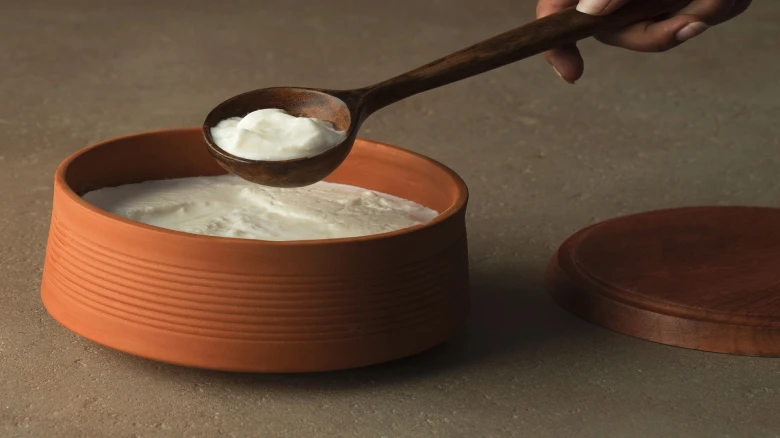Regional

Curds, which are high in probiotics, help with digestion and immunity. They are high in critical elements such as calcium, protein, and vitamins, making them a healthy complement to any diet.
Digital
Desk: Curds have a special place in many people's
hearts and meals, particularly in India. Curds are a versatile and healthful
addition that retains a valued place in Indian culinary traditions, whether
savoured as a refreshing snack or eaten alongside regular meals. This creamy
and tangy dairy delicacy is enjoyed not only for its flavour but also for its
numerous health advantages. Curds, which are high in probiotics, help with
digestion and immunity. They are high in critical elements such as calcium,
protein, and vitamins, making them a healthy complement to any diet.
While many people make their own curd at home using jaman or
starter, others rely on commercial curds that are widely accessible in the
market. But which is better for you? In response, dietitian Bhakti Kapoor took
to Instagram to highlight that while picking between purchased curd and
handmade curd, it's critical to consider the probiotic content.
"In grocery stores, packed curd is pasteurised to extend
its shelf life and eliminate harmful bacteria." While pasteurisation makes
the curd safer, it also has an impact on the probiotic content," the
expert explained, adding that the process can reduce the quantity of beneficial
bacteria, including probiotics, in the finished product.
As a result, as compared to homemade curd, the probiotic level
in packaged curd may be reduced. "As a result, if you want to consume
active probiotics, homemade curd is the better option," she says.
She mentioned that homemade curds give you more control over the
fermentation process, allowing you to use fresh, live cultures or starters.
"You can ensure a higher concentration of active probiotic bacteria in the
curd this way." As a result, handmade curd is more likely to provide the
benefits associated with probiotics, such as improved gut health and
digestion," she explained.
However, this does not mean that you should abandon packaged
curd entirely, since it may still be a crucial component of a well-balanced
diet. "It contains a lot of protein and calcium." While
pasteurisation reduces the probiotic content, it still delivers some
nutritional benefits. "If convenience or availability are important to
you, packed curd can be a good option," Kapoor added.
The nutritionist concluded that the decision between packaged
curd and handmade curd is determined by your priorities and desired probiotic
consumption. "If active probiotics are specifically desired, homemade curd
is the best choice." However, if convenience is more important, packed
curd can still provide nutritious benefit, even if the probiotic level is
lower. When purchasing boxed curd, examine the ingredient list and choose companies
that value minimal processing and natural ingredients', she advises.
Vani Krishna, Chief Clinical Nutritionist, Manipal Hospital,
Varthur Road, Bangalore, stated that curd is a natural probiotic and includes
the daily requirements of calcium and phosphorus, as well as other trace
minerals. "Home-made curd is healthier than packed curd because it
contains no preservatives or flavouring," she says.
Krishna said that homemade curd includes lactic acid, also known
as lactobacillus, which promotes healthy bacteria in the gut, aids digestion,
and treats stomach ailments. "The live bacteria found in curd help to
boost immunity." "The more probiotics that can be obtained from
homemade curd, the better," she explained.
Leave A Comment